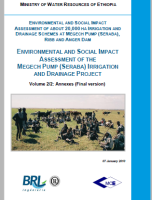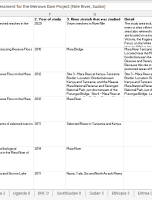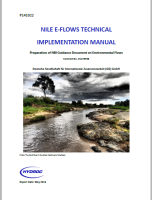Abstract
Two irrigation and drainage schemes are proposed on the floodplain surrounding Lake Tana, Amhara
National Regional State, Ethiopia. These schemes aim to transform the existing largely subsistence
agricultural systems into commercial smallholder farming. The two areas are similar in terms of
environmental, social and health conditions, and can be considered together in terms of health
assessment.
The proposed irrigation schemes will alter the environment, primarily as a consequence of supplying
water to the land during the dry season and thereby improving conditions for some diseases and
their vectors. In addition, the new agricultural practices will lead to increased contact between
human beings and water or wet soils. Such changes can affect human health (see, e.g., Keiser et al.
2005). At the same time, the economic and social benefits which the schemes are intended
to bring are likely to be
associated with significant improvements in health conditions.



